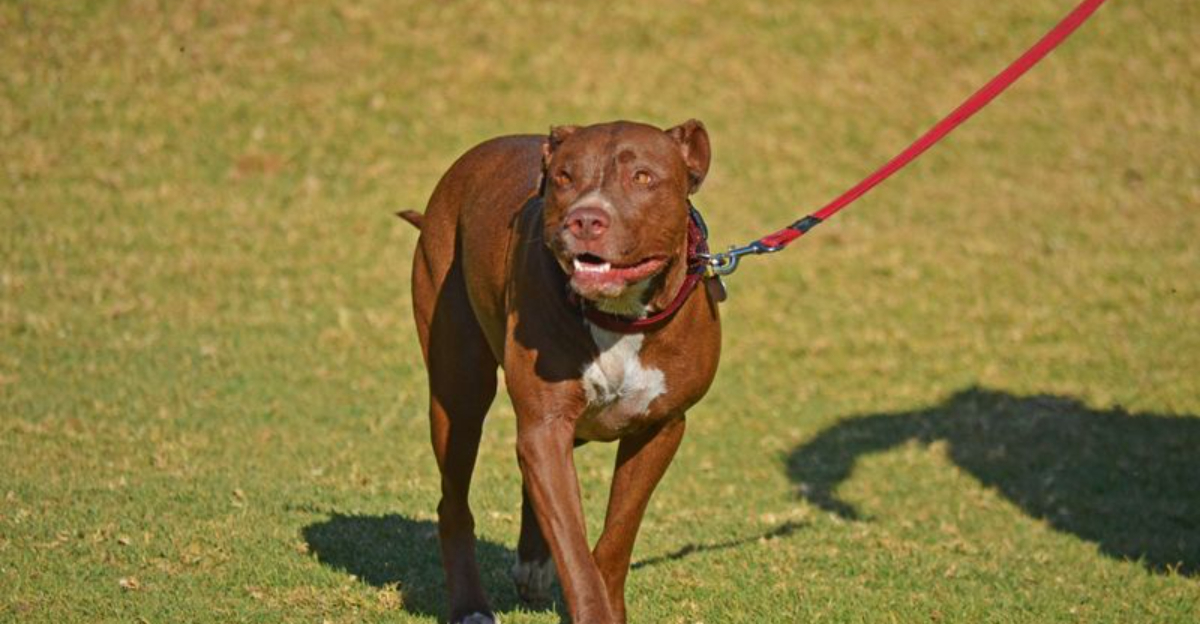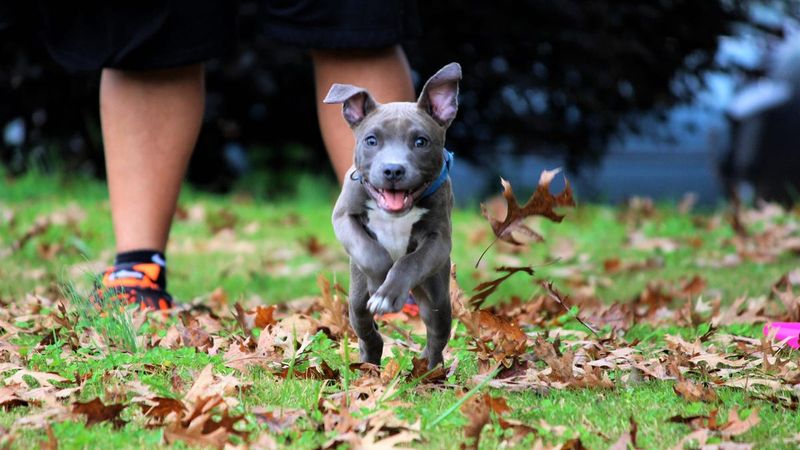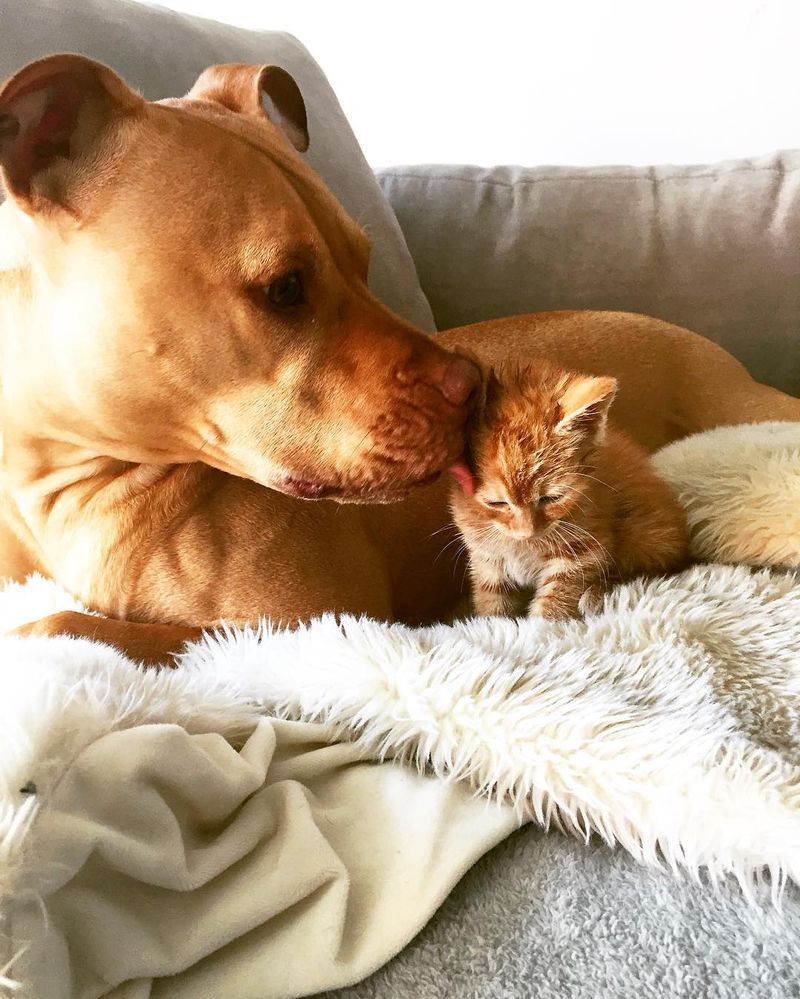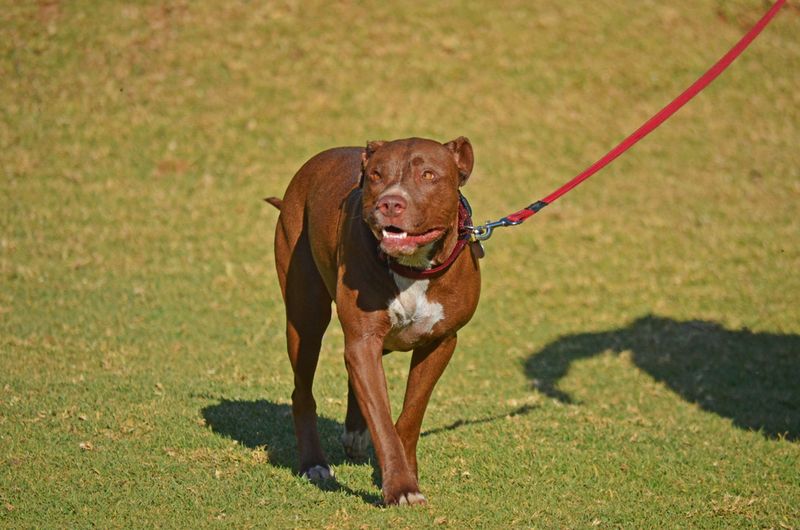Pit Bulls have long been misunderstood, with a reputation overshadowed by myths and misconceptions. However, these loyal and often gentle dogs deserve a fresh perspective. This blog post aims to debunk 12 common myths, revealing the true nature of Pit Bulls through facts and heartfelt stories. Far from being the fearsome creatures they’re often portrayed as, Pit Bulls can be loving companions, eager to show their affection. Let’s explore these myths and discover the real personality behind those soulful eyes, ensuring we give them the fair chance they deserve.
Myth 1: Pit Bulls are Naturally Aggressive
Often labeled as aggressive, Pit Bulls are misunderstood. These dogs are products of their environment and upbringing. Imagine a Pit Bull lounging on the grass, chasing butterflies with a wagging tail. Their loyalty is second to none; they thrive in loving homes where they are treated well. Contrary to popular belief, aggression is not inherent but often a result of mistreatment. Focused training and socialization highlight their friendly nature, making them well-adjusted pets. Pit Bulls, when raised in nurturing environments, reflect their surroundings, proving to be gentle and affectionate companions.
Myth 2: Pit Bulls have Locking Jaws
A common myth about Pit Bulls is their supposedly locking jaws. This biological impossibility is a figment of imagination rather than fact. Visualize a Pit Bull yawning, its mouth wide open, showcasing teeth but no locking mechanism. Scientifically speaking, Pit Bulls’ jaw structure is no different from any other dog’s. Their power lies not in a mythical lock, but in their strong will and determination. This misbelief has unfairly targeted them, overshadowing their true nature. Their playful antics and boundless energy are what truly define them, not a fictional jaw lock.
Myth 3: Pit Bulls are Not Good with Kids
Many believe Pit Bulls are unsafe around children. Picture a Pit Bull snuggled up with a child, both basking in warmth and love. This image contradicts the myth, showcasing their gentle interaction. Pit Bulls, with proper training and socialization, make excellent family dogs. Their affectionate nature and patience often surprise those who doubted them. These dogs can become protective, gentle guardians, acting like warm-hearted companions to little ones. Given the right environment, their nurturing instincts shine, making them as suitable for families as any other breed.
Myth 4: Pit Bulls are Only Good as Guard Dogs
The perception of Pit Bulls as solely guard dogs doesn’t encompass their true spirit. Envision a Pit Bull frolicking in a park, surrounded by a family enjoying a sunny day. These dogs are indeed protective but are equally playful and affectionate. Their versatility is unmatched; they excel in various roles, from therapy dogs to loyal companions. Their demeanor is adaptable, responding warmly to the love and care around them. While they can protect, their hearts are set on participating in family fun, exhibiting joy rather than constant vigilance.
Myth 5: All Pit Bulls are the Same
Lumping all Pit Bulls into one stereotype ignores their rich diversity. Visualize a spectrum of Pit Bulls, each unique in color and size, joyfully interacting. Just like people, each Pit Bull has its own personality and charm. From their coat colors to their individual quirks, diversity is their hallmark. These dogs are not defined by a single narrative but a mosaic of delightful traits. By embracing their individuality, we uncover the multifaceted nature of this loving breed, celebrating each dog’s distinct identity.
Myth 6: Pit Bulls Can’t Be Trained
Some say Pit Bulls are untrainable. Picture a Pit Bull, eyes locked on its owner, eagerly following commands during a training session. Pit Bulls are intelligent and responsive, thriving on structured training and positive reinforcement. Their eagerness to please makes them quick learners, debunking the myth of untrainability. With consistent guidance, they excel in obedience and agility, highlighting their keen intellect. Their adaptability and willingness to learn showcase their true potential, proving that they are far from the unruly image some perpetuate.
Myth 7: Pit Bulls are Dangerous to Other Animals
Concerns about Pit Bulls being dangerous to other animals are widespread. Imagine a Pit Bull curled up with a cat, both peacefully asleep. This scenario defies the stereotype, demonstrating their capacity for harmony. When properly introduced and socialized, Pit Bulls can coexist with other pets, maintaining a calm and friendly demeanor. Their playful interactions with fellow animals reveal their sociable side. Rather than danger, they offer companionship, breaking the misconception with every wag of their tail and playful nudge.
Myth 8: Pit Bulls are Not Intelligent
Pit Bulls are often underestimated in terms of intelligence. Envision a Pit Bull, furrowed brow and concentrated expression, solving a puzzle toy. Their intelligence is evident in their problem-solving skills. These dogs boast a sharp mind, eager to learn and engage in mental activities. Whether mastering new tricks or tackling complex activities, their cognitive abilities shine. Their wit and curiosity make them engaging companions, challenging the notion of limited intelligence. By recognizing their mental prowess, we appreciate the full spectrum of their capabilities.
Myth 9: Pit Bulls are Too Energetic for Families
Some portray Pit Bulls as too energetic for family life. Visualize one lying peacefully next to a sleeping baby, embodying tranquility. While they possess energy, they are equally capable of calmness and gentleness. Their ability to adapt to the family dynamic is remarkable, ensuring they meet the household’s pace. Their playful bursts are balanced by moments of serenity, providing the best of both worlds. Far from being chaotic, they enrich family life with their adaptable nature and serene disposition.
Myth 10: Pit Bulls are Hard to Control
The belief that Pit Bulls are hard to control stems from misunderstanding. Picture a Pit Bull, leash in hand, walking obediently beside its owner in a park. Their ability to follow commands and showcase manners defies the myth. Regular training and clear communication build strong bonds, ensuring they are well-behaved. Their loyalty and willingness to please make them receptive to guidance, transforming them into exemplary companions. With the right approach, control is not only achievable but becomes second nature.
Myth 11: Pit Bulls Don’t Make Good Therapy Dogs
There’s a misconception that Pit Bulls lack the temperament for therapy work. Picture one comforting an elderly person, resting its head softly on their lap, radiating warmth. Their empathetic nature shines in therapeutic settings, offering companionship and comfort. Their ability to sense emotions and respond with gentleness makes them ideal therapy animals. By offering support and boosting morale, they defy the stereotype, proving to be invaluable in healing environments. Their calming presence and kind eyes create connections that heal and console.
Myth 12: Pit Bulls Can’t Live in Apartments
It’s believed that Pit Bulls require vast spaces to thrive, but imagine one basking in the sun on a small apartment balcony. Their adaptability means they can flourish in diverse living situations. As long as they receive adequate exercise and attention, apartment life suits them well. Their ability to adjust to various environments is remarkable, proving that size is no barrier. With regular walks and playtime, they enjoy urban living just as much as a house with a yard, showing that home is where the heart is.












